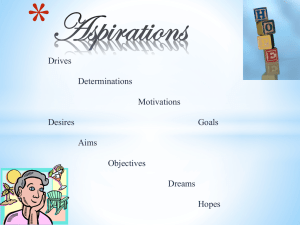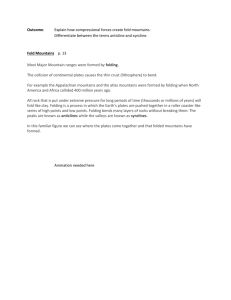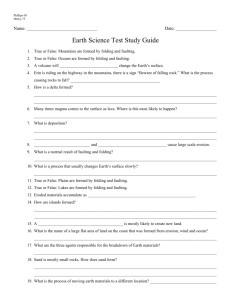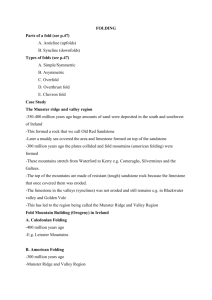shopping little while at Ross
advertisement
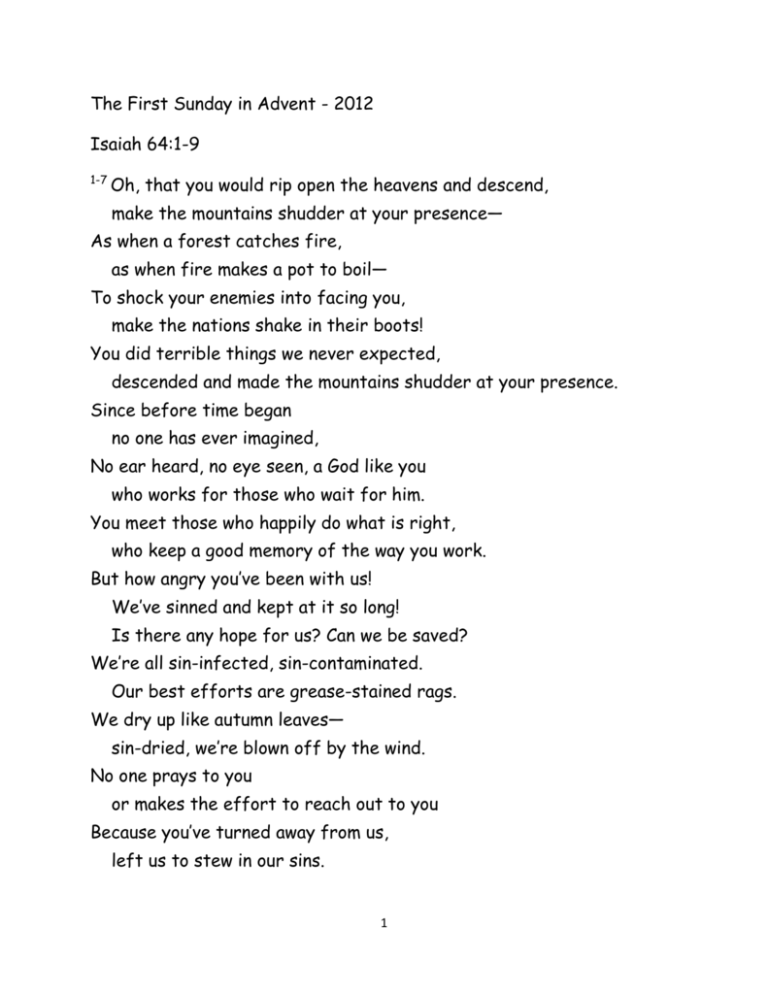
The First Sunday in Advent - 2012 Isaiah 64:1-9 1-7 Oh, that you would rip open the heavens and descend, make the mountains shudder at your presence— As when a forest catches fire, as when fire makes a pot to boil— To shock your enemies into facing you, make the nations shake in their boots! You did terrible things we never expected, descended and made the mountains shudder at your presence. Since before time began no one has ever imagined, No ear heard, no eye seen, a God like you who works for those who wait for him. You meet those who happily do what is right, who keep a good memory of the way you work. But how angry you’ve been with us! We’ve sinned and kept at it so long! Is there any hope for us? Can we be saved? We’re all sin-infected, sin-contaminated. Our best efforts are grease-stained rags. We dry up like autumn leaves— sin-dried, we’re blown off by the wind. No one prays to you or makes the effort to reach out to you Because you’ve turned away from us, left us to stew in our sins. 1 8-12 Still, God, you are our Father. We’re the clay and you’re our potter: All of us are what you made us. Don’t be too angry with us, O God. Don’t keep a permanent account of wrongdoing. Keep in mind, please, we are your people—all of us. SERMON The candle of hope is lit. Do we know what hope is? Do we know what it means to hope? The way we use hope in our everyday speech, our hopes sound more like a somewhat selfish wish list of the human condition: I hope that “check engine” light on my dashboard isn’t anything too expensive. I hope the church basement doesn’t flood with all this rain. I hope the weather is good for my hike. I hope the Packers make the playoffs. In all of those examples, we may as well replace hoping with wishing. Eugene Peterson writes this in a book of daily devotionals: “Wishing grows out of our egos; hope grows out of our faith. Hope is oriented toward what God is doing; wishing is oriented toward what we are doing. Wishing has to do with what I want in things or people or God; hope has to do with what God wants in me (and the way I live my life) and in the world and in all people beyond me.” Examples: 2 When we say, “I hope it doesn’t rain on my parade” that is wishing for something for me. When we say, “I hope we begin to care for earth, the precious gift of God to us that makes life possible.” That is hoping. Elizabeth Barrette has a poem that I think adds something more to the meaning of hope. It’s called “Origami Emotion.” She writes: Hope is Folding paper cranes Even when your hands get cramped And your eyes tired, Working past blisters and Paper cuts, Simply because something in you Insists on Opening its wings. The origami paper cranes were about peace. To me she is saying hope is doing something, working relentlessly to bring about the reality of something God wants, in this case peace Speaking of folding paper . . . . this August, just a couple of days after I came back from building our cottage in WI, our daughter, Bethany, now a single mom, came for a visit with her two boys, Carter and Blake, six and three. You maybe saw them at the church picnic in Rankin Park. After she was here for almost a week she and Sharon ask if I would watch the boys for ‘a little while’ while they went shopping at Ross. I 3 well knew what ‘shopping little while at Ross’ meant for those two bargain hunters. I was in for a very long afternoon My babysitting adventure started out poorly. Once Blake (the 3 year old) realized that Mom was leaving he began this major meltdown. Screaming and crying and pleading NO!! NO!! Once the door was closed he began hurling himself into the door and finally ended up throwing up all over the carpet. Older brother Carter casually said, “Oh, he always does this – just ignore him.” When things settled down I hauled out Noah’s old dinosaurs, and his matchbox cars and we began to play with the cars and dinosaurs which lasted a little while. Even though these kids aren’t biologically related to me they seem to have inherited my attention span. An hour or so transpired and I was beginning to understand what my Grandpa Butch used to say to me with a soggy cigar in his mouth and a glass of brandy in his hand, “Why don’t you go out and play in traffic?” I was digging deep for ways of amusing them, I asked, “You guys know how to make paper airplanes?” and they said no so we began to have a paper airplane workshop. (remember I said speaking of folding paper) Well it turned out to be a big hit – for a while – and then it was on to taking the dogs for a walk and whatever else I could think of. Later on in the afternoon – the shoppers were still shopping – I heard Carter having his own meltdown in the kitchen. I went to see what it was about and he was sitting at the table with several sheets of crumpled paper in front of him – his arms folded across his chest and a big scowl on his face – saying over and over – “I can’t do this!!!” 4 “Yes you can. Remember that awesome plane you made a little while ago? You didn’t have any help making that one. I know you can do it again.” And then he reaches up and picks up the paper, still scowling, still frustrated; and he folds one part of the paper over into a triangle, and then the other side. And I say, “Yes! There you go!” More folding now, and the airplane’s really starting take shape, and it’s a beauty; but he still wants to hang onto that scowl a little longer. So, I keep pressing, “What are you so sad about? Look at what you’re doing! That thing’s going to be awesome!” And now he’s fighting back a smile, keeping his head down as he works. And then it’s finished. “Yes! That looks great, Carter! Look at that airplane!” And it flies!! Hope is rolling up our sleeves and folding the paper airplane or crane and getting past the tendency of giving up - of folding our arms, scowling and saying, “I can’t – what’s the use”. This is how it was with the Israelites, and this is how we are when it comes to letting real hope into our lives. Things go wrong in life, things that douse our hopes; and over time we become comfortable just sitting back and accepting it as the way things are: “It won’t get any better than this. What can I do?” We live in the self-imposed confines of indifference where our 21st century standard of living rolls its eyes at injustice, as if it’s just a naturally ingrained part of everyday life. Where is the church? Where are our hopes? 5 Reflecting on this morning’s text, I imagine the Prophet Isaiah sitting across the table from the Israelites: all of them slouching with their arms crossed, scowling, and saying, “We can’t do it.” So, then comes the Prophet Isaiah with the call to hope that rings true for us this morning: “O Lord, you are our Father. We are the clay, you are the potter: we are all the work of your hand.” The point of this Scripture is to renew the people’s hopes. The renewal of their hope, insists the Prophet Isaiah, depends on their recommitment to remembrance. If they simply take a look and remember all that God has done through them in the past. From the history of the Israelites: We are the ones that you freed from slavery in Egypt, O God. We are the ones that you delivered into freedom, the ones that you guided into the wilderness, the ones whose thirst you quenched from the water that sprang from that rock at Horeb, the ones that you provided with quail and manna in the desert, the ones that you nurtured and shepherded and never let go. When we roll up our sleeves and let hope work in us look what happens. In 1963 police turned hoses on black youth and release dogs on nonviolent protestors of segregation in Birmingham, Alabama. Those images made it to our TV screens. We saw it, we were outraged, and the Civil Rights Movement gained traction over the wakeup call to the reality of injustice and it was the advent of hope. The 1964 Civil Rights Act followed suit. When we see images of women and men returning home from war missing limbs and here testimony to the psychological ravages of PTSD, and we hear our political leaders using poisonous language about human 6 beings as a matter of course, and witness an innocent elderly woman being pepper sprayed by the police, do we just shrug our shoulders and say, “Well, it won’t get any better than this. What can I do.” Where have our hopes gone? Have we people of faith forgotten the power that comes in hoping for the realm of God? Have our ears become so deafened by indifference that we cannot hear the Prophet Isaiah speaking across the ages: “O that you would tear open the heavens and come down”. God works through those who remember the miraculous power of God in our lives and in our world, God works through those who never stop longing for the possible that this world decries as impossible, God works through those who always hope. Why has an acceptance of injustice become our standard of living? Where has our hope gone? Where has our belief in hope gone? Well, today is the first day in the Christian calendar year. Today’s our New Year’s Day. So, if January 1st is a time for resolutions, those things that I will do, then today I want to share with you a few of my hopes, some things I expect God can do through us. It’s World Aids Day – I hope we begin to do all we can to eradicate the ravages of this disease. I hope to never hear another human being referred to as “illegal.” I hope that the next generation will learn and then teach us to never say “that’s so gay” about anything. I hope for an end to our addiction to war. 7 I hope the leaders of this nation will begin to formulate a plan to reverse climate change. I hope for an end to world hunger. I hope that forgiveness and reconciliation become the ultimate desire of every human heart. I hope that Christmas will serve not as a processing of our wishes, but as a culmination of our hopes. These are a few of my hopes. And this isn’t too much to ask. It’s just a standard that we’ve forgotten. It’s a standard that God breathed into being and that God reminded the Israelites of throughout the pages of the Bible. It’s a standard that Jesus Christ always taught, and that he gave his life for us to never forget. For Christians to lean on the tenets of our faith and point out the immorality and the injustice of poverty and the gap between the rich and poor in our country should not be theological rocket science. It should be as simple as folding a paper airplane. For us to hope and work for an end to hunger, for us to long for an end to war, for us to hope for a world that resembles the teachings of Jesus should not just be some radical blog. It should be as simple as folding a paper airplane. So, as we begin the Advent season in anticipation of Christ’s birth, what are we hoping for? What are we truly hoping for? What are we rolling up our sleeves and getting to work for? Pick something and make it your passion. Is there something inside you that insists on opening its wings? 8
